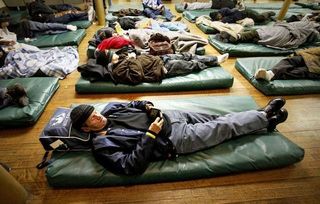Personal Perspectives
Schizophrenia in Winter
Even while living outside in inclement weather, I didn’t ask for help.
Updated July 15, 2023 Reviewed by Lybi Ma

Every winter, from December 15 through the end of February, my church opens up its basement to the homeless, turning it into a shelter from the Cincinnati ice and snow.
Tired, dirty men and women sleep on small cots covering the basement floor with little room in between and not much privacy. Many are mentally ill. Every homeless person who uses the shelter is given their own backpack and a blanket, but a blanket is hardly sufficient in frigid weather. Persons may enter the shelter at 8 p.m. and are welcome to stay until 7 in the morning when they must leave.
Fortunately, in Cincinnati, many small organizations serve the homeless, and there are places where they can eat free meals and rest throughout most of the day. But when there is nowhere else to go, libraries often become a refuge for the Cincinnati homeless to escape the bitter cold.
I feel a deep and personal connection with these people as I look back upon my own life.
While homeless in Los Angeles from 2003 to 2007, I regularly slept in libraries at night and spent hours in different libraries during the daytime. Libraries became my shelter in inclement weather. During my fourth year homeless, I was banned from entering a library that was open 24 hours, but I frequently spent a few hours a day in other libraries in the morning and afternoon.
In Los Angeles, the temperature rarely falls below 50 degrees. Living outside on the street all year was possible, though difficult in rainstorms, as I struggled to find shelter and the chilly wind broke through.
Life for the homeless in Cincinnati is very different than it is for people in Los Angeles. The homeless in Cincinnati need to find indoor shelter to survive in freezing rain and snowstorms.
Sometimes, I wonder what I would have done if I had been living in Cincinnati when I initially became homeless. Would I have traveled to a city with a warmer climate? Would I have finally consented to enter a homeless shelter (which I never did during my four years homeless in Los Angeles)? I doubt I would have decided to accept help from friends and family, as my paranoia prevented me from seeking their assistance. Would I have died outside?
My four years of homelessness ended when I was picked up by police for screaming back at the voices in my mind. But what if my schizophrenia had been more subtle? What if I had continued to be greatly paranoid but never heard irritating voices in my mind that made me scream? Would I never have been picked up by the police? Would I be living outside to this day?
To be picked up by the police for a mental illness, a person must be considered a danger to self or others or gravely disabled (aimlessly wandering the streets, unable to take care of one’s most basic needs). These criteria prevent the mentally ill from being readily picked up and taken for observation.
A hundred years ago, American society had a very different problem. It was all too easy to be committed against one’s will to a psychiatric facility, and the average psychiatric hospital stay ran from several months to years. A psychiatric hospital might be overcrowded and filthy. Residents of these facilities were often restrained, abused, and neglected.
But I was homeless and living outside in 2007, at a time in America when becoming more acutely mentally ill actually worked in my favor. The symptoms of my progressively deteriorating mental condition became so obvious that I was picked up by police for psychiatric evaluation and treatment.
My experiences in the hospital (which were brief) occurred in nicer facilities, with natural light, good food, caring staff, and newer medications (without the horrific side effects often associated with older drugs).
Once I was on medication, I rebuilt my life.
When I meet people who live in my church’s homeless shelter, they generally do not appear to be acutely psychotic. Many are very sick, no doubt, but do not meet the criteria of “danger to self or others.” Because they don’t meet the criteria, they are not offered medical help.
I wish homeless shelters could bring in psychiatrists to diagnose the mentally ill and encourage them to begin the kind of medication that essentially saved my life. If these homeless people had Alzheimer’s Disease, stroke, cancer, or infections, they would likely be provided with excellent medical treatment. Doctors and nurses would monitor them to be sure they were improving.
When I see the homeless and mentally ill at my church, I feel so powerless. Through telling my story of homelessness, mental illness, and recovery, I hope to encourage more struggling individuals who need it to seek out medical help and not be ashamed to have a brain disorder or to be called “mentally ill.”
I hope that persons with severe brain disorders like mine in America will someday not have to reach rock bottom before they are picked up and encouraged to begin life-saving medications.




